The dental marketing playbook is a full and comprehensive look at dental marketing in 2021, No time to read it all right now? No worries. Download the entire guide now.
One-third of dentists rank new patient acquisition for their practice as an important goal. Although over the last decade dentists' desires to attract new patients has not changed, the path patients take to research potential healthcare has. Digital media and the internet have become indispensable for patients to use on their journey to dental healthcare. Now more than ever, patients use the internet to research their healthcare before making the 'buying' decision. This means that in order to keep your existing patients, and to acquire new ones, you will need a dental marketing strategy in 2023 that can keep up with your patient's digital behaviors because...
Patients are clearly in the drivers seat now.
Not only have patients become smarter internet users, but the tools available to patients are fully empowering them to make high quality healthcare choices. The latest research from Google shows that 77% of prospective patients do their research online with search engines, 76% of prospective patients do research on the providers website, and 52% are researching their health care options through general information health sites. Your patients are online, and you should be too.
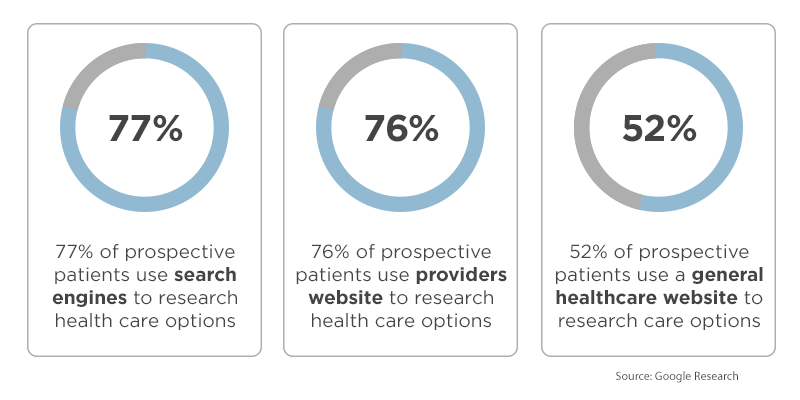
The digital competition to acquire dental patients is pretty fierce. The same Google research recognizes that 48% of prospective patients do two or more weeks or research before selecting their provider, and 61% visited two or more provider websites before converting into a lead. Using the internet and provider websites is no longer just for younger patients. According to Pew Research, 61% of Americans 65 and older have internet access, and social media usage for this age group has tripled since 2010.
For patients who book an appointment online, digital content is the critical link to conversion.
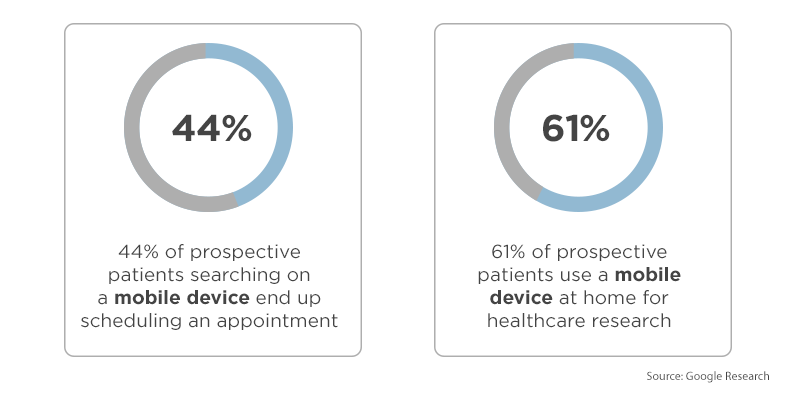
It is undeniable that prospective patients are going online to shop for a new dentist. They are using search engines and dental practice websites to determine if any given dental practice is a good fit for their dental needs. This is why it is important for dentists to rank on the first page of Google for the search terms most relevant to their practice. For dentists whose digital marketing strategies have not kept up with the times, this can be unattainable. If you are a dentist with outdated digital marketing strategies, you'll likely have a website that is poorly designed, minimal in content, or the kiss of death for dental practices - slow loading. Websites like these are doing something far worse for the practice than simply not generating leads, they turn away prospective patients potentially forever by offering an unappealing and outdated solution in their search for a new dentist.
The Diamond Group Blog is our favorite spot where we regularly share our opinions about the practice of online marketing for dentists. We encourage you to subscribe to the blog to receive our regular updates that will keep you up to date on the latest trends in dental marketing. We also realize that many of you have come across The Dental Marketing Playbook for Growth because you have recognized an issue in the marketing of your dental practice, and you're searching for guidance. This is why we've created the ultimate guide for dental marketers, so that you can create the winning digital marketing strategy that your dental practice needs today.
We don't call this "The Playbook for Growth" for nothing. Dental marketing has many parts and pieces needed to create a successful marketing strategy. Looking at marketing for dentists comprehensively ensures that your marketing efforts are effective in growing your practice. By publishing this content, we are hoping to highlight the most effective methods to move the needle in your practice. Throughout the guide, we highlight research by other knowledgeable sources through links, and we encourage you to follow these links to gain a better contextual understanding of the information we're providing.
Dentists who partner with The Diamond Group will recognize many of the recommendations and research in the 2023 playbook. This is because we are a full service dental marketing company that truly practices what we preach.
The dental marketing playbook is a full and comprehensive look at dental marketing in 2021, No time to read it all right now? No worries. Download the entire guide now.
Modern marketing is complicated, and it's mainly digital. Less than 20 years ago, it was pretty effective to publish an ad in the yellow pages and wait for the phone to ring. Fast forward to 2019, and effective dental marketing means you to know what to pay attention and what "not" to pay attention to. You can't be everywhere without being nowhere. We believe that the best way to attract new patients to the office with dental marketing is by running a three legged race.
The success or failure of every marketing campaign hinges on how well it attracts leads, converts those leads into patients ,and then delights those patients so they become a referral source to the practice. We believe in growth driven website design to create a website that continuously improves, inbound marketing to boost SEO rankings and to enhance visibility in search engines and a smart social media strategy to engage and delight patients.
We've organized our guide into three distinct sections:
We think of it as a three legged race because all three of these "legs" have to work together. A poorly designed website will have a severe negative impact on your SEO and search engine visibility. A failure to create engaging content will not only dampen your search engine optimization strategy it will cause your social media strategies to suffer. All three legs must work together and you are only as fast as your slowest leg.
Let's start with leg number one, your dental practice's website.

A great website is arguably the most important asset a dentist can have for their dental practice. It certainly is the most important asset when it comes to attracting, converting, and delighting patients and prospects. There is nothing else a dentist owns or has access to that attracts prospective patients and stays with them all the way through their first appointment and beyond.
Search engine algorithms are constantly changing and evolving, and 2022 has brought its own set of changes. You must have the mindset that your website is an asset in need of continuous improvement, and a 'set it and forget it' mentality will get you nowhere fast. This doesn't mean that every year you need to start over on your website, it just means you have to be ready to adapt. Many of the essential elements have been on our list for some time and will remain there for years to come. Others like voice optimized SEO and live chat, are new to the list this year.
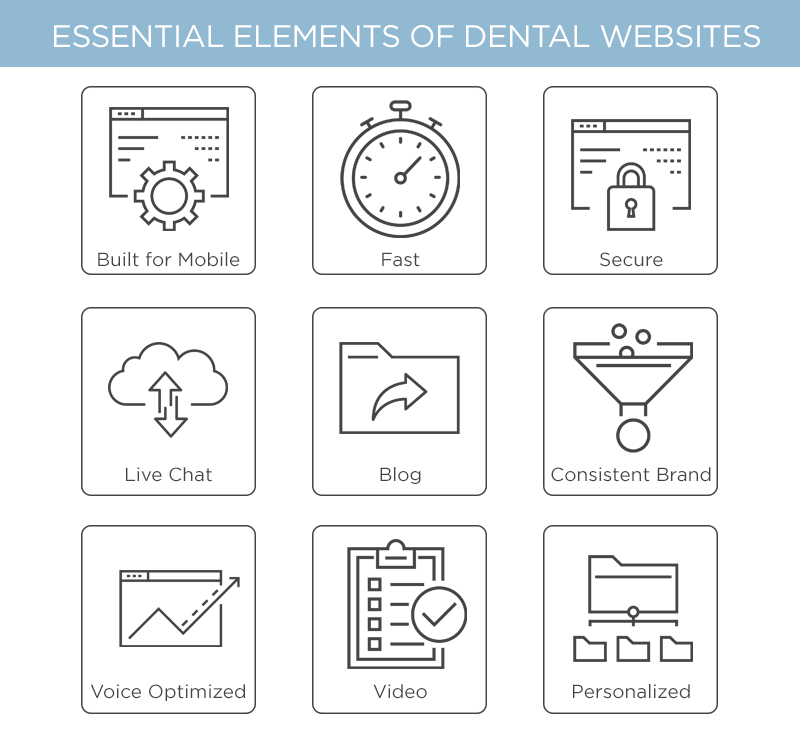
Every dental practice is different and offers it's own unique personality and values system. For this reason we recommend a custom dental website design. Building a custom dental website will allow you to stand out as an elite dentist in your market and will convey your personality to the market. Even though we do recommend custom websites, there are many website pages that we consider essential to the design and that users will expect to see on your website.

It's tempting to think that your home page is the most important page in your websites architecture. While, it's generally the most visited website page and it's the web page where most marketers will spend their time optimizing, for most dentists the home page page is not the most important page. The home page is normally the gateway page. It gets you to the next page - the website page that you really want to see.
This isn't intended to take anything away from the value of your home page. It is very important. It will be the website page that attracts the most visitors. The home page also sets the design standards for the entire website. The brand characteristics from the home page should be carried through to all of the other interior pages.
A dental practice's home page is generally the one that will pop up first in search engine results for branded search terms. A branded search term is a search for your practice name or a dentists name.
Home pages also pack the most domain authority on websites. A domain authority score helps define a pages relevance to search engines.
Home pages should be designed to quickly and clearly answer the most important questions that patients and prospects might ask. The attention span of website visitors is not very long so make sure you cover the basics right up front. Make sure to immediately mention your most important services. Are you a cosmetic dentist? A pediatric dentist? An Invisalign provider? A holistic dentist? Patients do not have a lot of bandwidth to figure this out so it's important to be clear.
Incorporate video into your home page website design and tell the story of your brand. Dental practices using HubSpot can now incorporate their videos right into the marketing platform.
Search engines will look to your home page content to figure out what your website is all about. Image heavy websites light on text will perform poorly in search engines. Text is the best way to communicate to search engines what your practice is all about. 400 words is the minimum amount for a website home page for dentists. Less text and your home page will have a difficult time ranking on page one.
The home page is your gateway page to your services and information about the practice. It should also include options for easy communication with your practice. Make it easy for patients to get in touch or to book an appointment. Display your phone number in a prominent position and make contacting you easy with a contact us link or booking CTA in a visible spot. Many patients do not want to sit on hold and prefer a more instant form of communication. Live chat for dentists gives the practice an ability to provide instant answers. Live chat is great for patient engagement and it keeps website visitors on your website.
Reviews are really important to prospective patients. A dental website homepage is the perfect spot to showcase your top reviews.
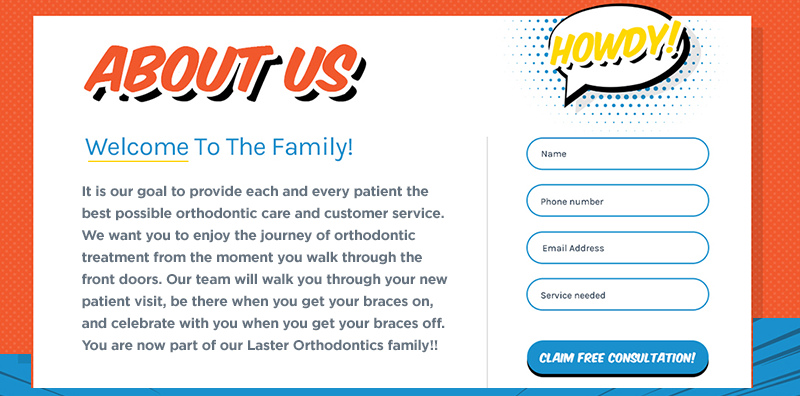
The website page that generates the 2nd highest amount of visitors for dentists is the About Us page. Patients coming to this page are looking to learn more about the dental practice. Before booking an appointment or opting in to content they will come here to find answers to common questions.
The about us page is a great spot to highlight your offices personality. Use team bios to accentuate the excellence in your teams training and their unique ability to provide excellent care. Provide enough unique information about your team to give visitors a good idea of what your team is like in person. Where did they go to school? What's their passion? What kind of pets do they have? These personal details enhance the bond between patient and practice.
When you are posting fun photos of your team on social media, link back to your about us page where patients can "learn more" about your incredible team.
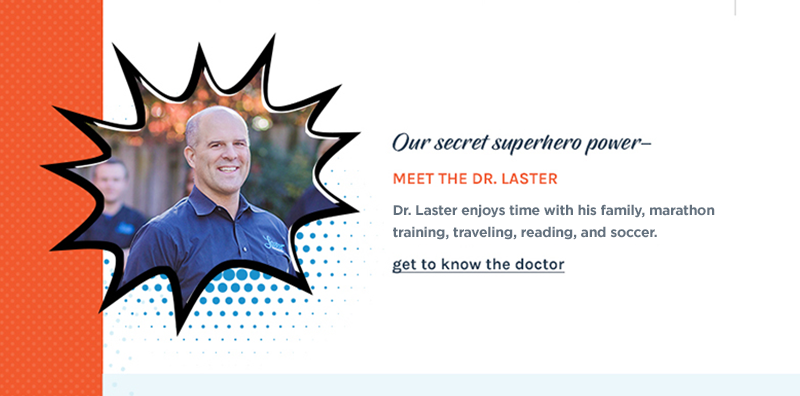
Another important page for prospective pages is the "Meet the Dentist" website page. Patients are putting their care into the hands of their chosen dentist and they would like to more about them. Many patients are looking to discover where the dentist went to school and to better understand their background. Have more than one dentist in your practice? You can combine them into one page or separate pages for each dentist can give an added boost to search engine optimization. Separate pages will rank better for a branded search of each doctors name.
Website pages for dentists should include information that exhibits their authority in dentistry. Does the dentist contribute to the practice blog? Link to their written content from the page. Education and industry affiliations or awards can showcase the expertise of the dentist. Link out to associations and institutions that support the dentists background.
Patients are looking to create a personal relationship with their dentist. Sharing the dentists interests and personal hobbies will help to make this connection. Many people are scared about going to the dentist. Letting prospective patients know that the dentist is kind, caring and compassionate will go a long way towards filling your practice schedule.
Remember to highlight the dentists personality. The fun photos of the dentist that you are sharing on social media will go perfect on a dentists website page.

Services pages are important to include on your website. These pages provide valuable information to patients regarding the services the practice offers that can help them when deciding on a new dentist. Having individual pages for every service you offer is also a prime SEO opportunity as each page will rank for specific keywords and search terms that are important the practice. Having the services on separate pages will help each service stand out in search engines and increase the likelihood that they will be found.
A services page should provide sufficient information to inform the patient about the service and what the practice will provide. When developing these pages it's important to focus on what an average reader of a page would expect to discover. Patients did not go to dental school so they don't need to be highly technical pages. They do need to clearly communicate the service that is offered and to encourage patients to connect with you to learn more. Patients seeking more detailed information will have no problem asking for it.
A good services page will contain 400-600 words or more. They should outline the basics of the treatment, what the patient can expect, and any information the patient might need to know. Some current patients with an appointment already booked will use your services pages to learn more about the procedures they are about to undergo. Help them in their journey by providing useful information and links to more in depth content to learn more. Including live chat on your services pages is also a smart idea. Patients have questions and your practice can position itself as the expert without having to send patients away to other medical websites for answers.
Branding is important to keep in mind. The SEO value of services pages for dentists is high and these pages will rank well in search engines. With this high SEO value it's likely a services page will be the first page a visitor sees on your website. Make sure it's a good first impression by staying on point with your brand identity.
Link out to other pages on your website to help patients find information they're interested in. Doctors bios, patient reviews, and blogs or video content will help patients learn more.
The contact page on your website is a very important part of the patients journey. This is the premier page that patients will use to connect with you. Make sure your contact page is clear, concise, easy to read and offers numerous ways to contact the practice. A contact page should be accessible from any page on the website. It's a must to have in your main menu navigation.
Not all patients want to communicate the same. Some will want to call. Some will want to fill out a form. Others are looking for more of an instant form of communication like texting or live chat. Make all of those options available on the contact page for patients to connect with you as they prefer.
There are a number of other website pages dentists use to attract patients to their practices beyond our essential list. Dentists add these pages to gain additional SEO value, or to provide
Before/After
Blog/Resource Pages
Reviews
Other pages (pillar?) Landing? Offers?
On to the next piece of the dental marketing puzzle, SEO.


Browsing potential patients, and search engines, use this information to determine what your webpage is about.
As a dentist, one of your most important digital marketing tools is having a local SEO strategy. Since your competition is typically other local dental practices, staying on top of local SEO standards and trends will keep your dental practice at the top of patient searches

Six Directories to Get Listed on ASAP
The best marketing strategies for dentists are data-driven, and your website is where you'll get the data. Behavioral signals like click-through-rates, mobile clicks to call, and check ins all play an important role in SEO, and local SEO in particular. To send your local SEO strategy to the next level, you should be familiar with what Google Local Packs are. Google Local Packs are prime real estate when it comes to being seen by a wide audience on the front page of search engine results pages. When you're listed as one of the 'Elite Three' in a local pack, your click-through-rates (CTR's) and conversion rates from website visitor to paying customer will increase exponentially. Getting in the local pack is tough, but can be done with the right knowledge.
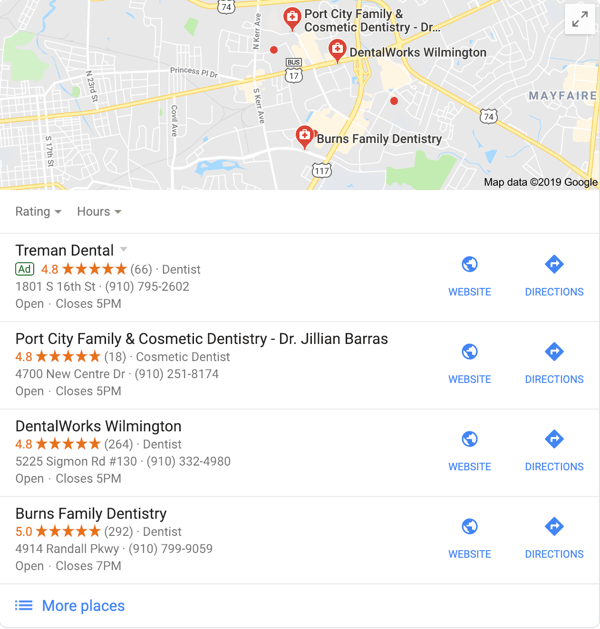
To understand how to get included in the Google Local Pack, here is a breakdown of the ranking factors, and how much each affects the Elite Three:
Once you start thinking like your patients, you'll be able to come up with content topics to write about. Next, you should start thinking about what keywords should be in your blogs. Keyword research is an important step in creating and optimizing your content. It is used to identify popular words and phrases people enter into search engines. Keyword research will help you figure out what keywords you should try to rank for with your content. You can learn all about how keywords and blogging come together for SEO in our blog.
By researching the words and phrases your potential customers search, and using this research to create content that is targeted to their specific questions, you can drive high-converting traffic to your website. Some terms to understand in relation to keywords research are:
Just remember to go for keywords that are:
An example could be that you want to write a blog about gingivitis. Gingivitis has a search volume of 130,000 per month and has a low competition score: 18 out of 100. This is a good sign! Google suggestions tells us there are other relevant long-tail keywords for gingivitis.
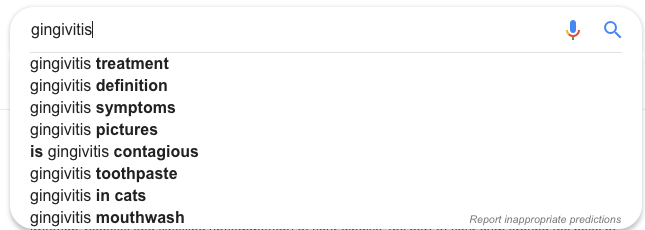
Do any of these long-tail keywords align with your content? If so, great, use them! Mindfully writing your content while building in long-tail keywords will help your content rank for more terms and searches about your core topic. You should even include local SEO keywords in your content. Using the gingivitis blog example, keywords like 'gingivitis treatment Wilmington NC' could help your next patient find your dental practice over your competitor.
As a dental practice, you should think of social media as a tool your practice uses, not a thing you 'have'. Social media is a great way to connect with potential and existing patients, and to tell them the story of your dental practice's brand. Facebook alone had 2.27 billion registered users in 2018, and your patients are included.
As a dentist, you may think you are just selling dental services like teeth cleanings or veneers, but what you're really selling is health, confidence, and trust. This is your brand story, and social media gives you the opportunity to tell it.
Now more than ever patients are educating themselves online on products and businesses before purchasing. Social media plays a huge role in this research process, and now is the time to start influencing their decision with your social media strategy.
Your social media strategy should be an integral part of your overall digital marketing strategy. As a dental practice, your competition will be limited to other local dental practices. Social media is a great tool to:
Social media marketing can feel like a black hole of content that never gets full. It also can be difficult to document the true ROI of a social media investment. It can be very hard to show why a click to purchase happened. The reality is that many facets of your marketing strategy work together and not in silos.
Locations:
Copyright © 1995 - The Diamond Group, LLC, All Rights Reserved | Accessibility Statement